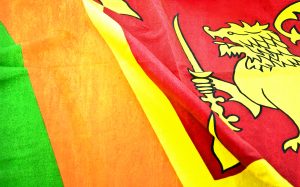Two reports about religious freedom violations in Sri Lanka issued within a week of each other demonstrate growing concern about human rights and interfaith relations on the island. A leading British religious freedom advocacy group and a special U.S. government commission both painted an increasingly problematic scene. Countries concerned about minority rights in Sri Lanka should engage Colombo on the merits of these reports.
Racked by civil war for more than two decades, Sri Lanka rarely makes it to the top of policymakers’ action lists today. The conflict pitted Sinhalese against Tamils, with the predominately Sinhalese Sri Lankan government fighting the insurgent Liberation Tigers of Tamil Eelam (LTTE). But in addition to ethnic friction, religious divisions persist. Sri Lanka is majority Buddhist, with significant Hindu, Muslim, and Catholic and Protestant Christian populations.
It is along religious lines with ethnic overlays that both reports highlight concerns. CSW, based in the United Kingdom, issued “A Nation Divided: The state of freedom of religion or belief in Sri Lanka.” The report thoroughly spells out the legal and policy challenges limiting religious freedom for minorities.
Regarding the Christian minority, the report found ongoing government discrimination, with Christians primarily “targeted through legal means, via orders to close or register their places of worship.” The 2008 Circular continues to cause problems for the registration of churches. Worship site issues are not limited to Christians, as the CSW report found: “Hindu kovils (temples) are coming under threat in the north-east as they are being replaced by Buddhist temples, and the grounds on which the kovils stand are being claimed as Buddhist archaeological sites by the Archaeological Department.”
CSW highlighted how the 2019 Easter bombings traumatized Christians and drove divisions between them and the Muslim community, with which they had generally enjoyed positive relations. I remember experiencing this comity when visiting Sri Lanka in 2018 in a special U.S. diplomatic role focused on religious minorities. In a meeting at the Slave Island Mosque in Colombo with Muslim leaders and Protestant Christians, they each took turns highlighting the other community’s challenges. But, unfortunately, relations remain fragile after the bombing and reprisal attacks on Muslim communities.
The CSW report also found the Muslim community experiences “severe” religious freedom violations. “A key factor in the violations is the perception by Sinhalese-Buddhist nationalists that Muslims are a threat to both Buddhism and the Sinhalese.” Buddhist extremists have used social media to provoke riots attacking Muslim neighborhoods, with little police response. The report also noted attempts to “reduce the visibility of Islam through the destruction of mosques and restrictive stances on religious clothing.”
Concerns about Muslim religious freedoms were echoed a few days later by the U.S. Commission on International Religious Freedom (USCIRF). USCIRF is an independent U.S. government advisory body separate from the State Department that makes recommendations on U.S. policy relating to religious freedom promotion. The fact that USCIRF chose to report on Sri Lanka for the first time in six years demonstrates concern about the country’s trajectory.
USCIRF’s report, “Religious Freedom Conditions in Sri Lanka,” warned about the use of the Prevention of Terrorism Act (PTA) to target Muslims and jail them for lengthy periods on trumped-up charges. It also noted how the “Sri Lankan government has proposed several measures that target the Muslim community and would restrict Islamic religious practices,” such as a ban on burqas and the closure of Islamic schools. USCIRF also highlighted Sri Lanka’s use of criminal blasphemy laws against minorities and free thinkers.
International pressure is needed to encourage Sri Lanka’s government to reform. However, it will not be simple due to the orientation of President Gotabaya Rajapaksa and his brother Prime Minster Mahinda Rajapaksa toward policies that favor Buddhism and Buddhist nationalism. They won the election on a political platform of division and will not quickly walk away from it. Thus, exacerbating interfaith tensions that lead to human rights abuses could be fulfilling campaign promises.
Furthermore, the authoritarian moves of the Rajapaksa brothers are a concern. Their decision in early 2020 to withdraw Sri Lanka from U.N. Human Rights Council Resolution 30/1 regarding post-war accountability and human rights was an early warning sign. The passage of the 20th amendment a year ago strengthened the presidential system and removed essential checks. Talk of a new constitution could further solidify this centralizing trend. In addition, the Rajapaksa’s pro-China tilt leaves them open to the worst examples of human rights abuses and one-party rule.
The United States, European powers, and Asian countries like India, Japan, and South Korea all have an interest in seeing Sri Lanka change course. The CSW report provides a comprehensive list of recommendations to encourage a different direction. U.N. mechanisms carry substantial weight and have an established track record, so they should be protected and enforced. Bilateral pressure for legal reforms, such as the PTA and the 2008 Circular, are needed. And should Sri Lankan officials participate in serious human rights abuses, the United States’ Global Magnitsky Act provides the ability to target individuals with sanctions. In addition, social media companies have a responsibility to moderate their content to prevent incitement to violence against minorities.
While small by Asian standards, the nation of 23 million deserves greater attention, as these trends could impact millions of people. In addition, these issues extend beyond human rights to the stability of the island. As USCIRF concluded, “If the government chooses to implement measures that further limit religious minorities’ enjoyment of religious freedom, the road to reconciliation will be even longer than before.”

































